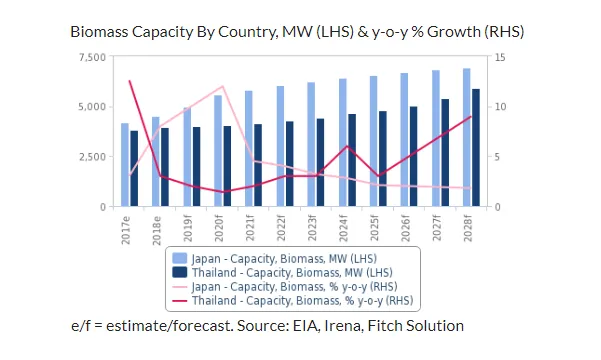
Japan and Thailand to lead biomass investments in Asia: report
Their biomass capacities are projected to hit 6.9GW and 5.9GW by 2028, respectively.
Both Thailand and Japan are expected to see a surge of biomass power investments over the next decade, as Thailand receives strong government support for the sector, whilst Japan's strong pipeline of biomass projects will continue to facilitate a capacity growth surge in the near-term, according to a report by Fitch Solutions.
Thailand’s vast biomass potential, driven by its agricultural industry and large amounts of agricultural and bio waste produced, has led to increasing attention from the government and support in the form of amendments in regulatory norms and attractive financial incentives surrounding the sector.
The country’s biomass sector is slated to be one of Thailand's key drivers for renewables growth as it veers away from a heavy reliance on natural gas-fired power despite expectations for Thailand to become a net importer of liquefied natural gas (LNG) over the coming years.
“This view is also informed by our expectation that coal-fired power growth will stagnate amidst popular opposition, meaning that there are ample opportunities for renewables as the Thai government seeks to deliver increased power sector investment to meet rising electricity demand in the country,” Fitch Solutions added.
As a result, the firm forecasts Thailand’s biomass capacity to grow at an annual average of 4.14% to reach 5.9GW by 2028.
Meanwhile, Japan's attractive feed-in-tariffs and subsidies for the biomass sector had led to a capacity boom and substantial backlog of biomass projects at present, at almost double of their 2030 targets, despite the government's scale back of policy.
“Japan remains as one of the largest biomass markets in the world, and continues to expand. The unexpectedly overwhelming response had caused the government to scale back its policy to ensure growth is kept at a manageable level,” Fitch Solutions explained, adding that the government has introduced more stringent sustainability requirements and deadlines for grid connection agreements and supply agreements.
The Japanese government has also switched to an auction scheme for the biomass sector in 2018, and signaled plans to reduce subsidies for biomass power plants. “We hence expect Japan's biomass capacity growth to surge in the near-term as the backlog progresses, and slow post-2020,” the firm highlighted.
Fitch Solutions forecasts the country’s biomass capacity to grow at an annual average of 4.43% to reach 6.9GW by 2028.
Additionally, Fitch Solutions noted that feedstock availability will be a concern for the sector as it expands, and could pose a downside risk to growth in Japan. The increasing reliance on wood pellet imports from Canada and palm kernel shell (PKS) feedstock from palm oil production in Malaysia and Indonesia also raises questions about the carbon footprint of the segment, with transport emissions, as well as costs, likely to become a pertinent hurdle as the sector expands.
That said, Japan is reportedly taking steps to increase biomass feedstock production domestically. “This has to expand fast enough to sustain the growth of biomass power,” the firm said.













 Advertise
Advertise











